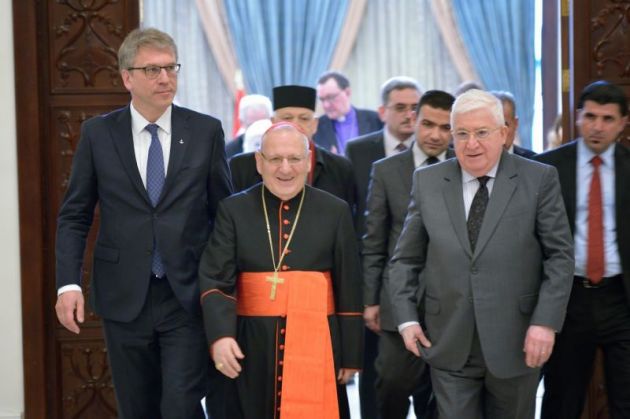Secure future for religious minorities in Iraq vital, says world churches group in Baghdad

As the onslaught on Iraq's second city of Mosul continues to oust Islamists belonging to the group known as Isil or Daesh, the head of the World Council of Churches has said, now is the time to rebuild Iraq.
"Governments need to see that now is the time to rebuild Iraq, to build new confidence in those communities so that in the future they can remain part of the great mosaic of Iraq," said the WCC general secretary, Rev. Olav Fykse Tveit.
Tveit and a group of church leaders met several political leaders throughout the country, including Iraqi Prime Minister Haider al-Abadi and President Fuad Masum, the WCC said in a statement Jan. 26.
They also held talks with the president of the Iraqi Sunni Endowment, Dr. Abdul Al-Lateef Al-Hemyem, during the visit of an international ecumenical delegation to Baghdad, Iraq, on Jan. 21.
Their meeting was at St. Gregory the Illuminator Armenian Orthodox Church in the Iraqi capital.
A global delegation of church leaders ended a trip to Iraq on Jan. 24, focusing on the future of vulnerable components of Iraq's society following the expected military defeat of the so-called "Islamic State" terrorist group.
The delegation called for an emergency response from international donors to support efforts to secure, stabilize and rebuild affected communities and societies.
The 14-member delegation organized by the WCC spent five days in Iraq, in both Baghdad and the northern Kurdistan region.
They met with the senior political leadership of both the federal government of Iraq in Baghdad and of the Kurdistan Regional Government in Erbil.
They met members of parliament representing minority communities, the heads of the U.N. Assistance Mission for Iraq, and representatives of other faith communities in Iraq as well as the heads of the country's Christian churches and Christian young people.
The WCC delegation welcomed the commitment expressed by political leaders both in Baghdad and Erbil to preserving the cultural, ethnic and religious diversity of the country.
"Having listened to the stories of displaced Christians and Yezidis, we greatly appreciate the essential and exceptional role played by many citizens and the Kurdistan Regional Government in receiving and offering refuge and support to people of many different communities who had to flee their homes to escape Da'esh in mid-2014," said delegation member Antje Jackelen, archbishop of the Church of Sweden.
Another member of the delegation, Father Michel Jalakh, general secretary of the Middle East Council of Churches, noted: "Churches, mosques and other religious institutions played a very important role in receiving and caring for internally displaced people in the Kurdistan Region, especially in the early phase of the crisis."
The humanitarian crisis resulting from the capture by "Islamic State" of Sinjar, Mosul and the Nineveh Plain in mid-2014 is ongoing, and the Kurdistan Region still hosts more than 3 million displaced people.
The delegation received a briefing from the UN Humanitarian Coordinator in Iraq, Rev. Frank Chikane, moderator of the WCC's Commission of the Churches on International Affairs.
After that Chikane said, "The international donor support is woefully inadequate to meet the continuing need, leaving the host communities and the KRG to carry the burden on their own."
TARGETTED BY IS
Members of communities targeted by "Islamic State" – including Yazidis and Christians – remain extremely vulnerable said the WCC.
Many members of these communities with the means to do so – especially Christians – are continuing to leave the county, further depriving Iraq of its cultural and religious diversity.
This is imperiling the future of the indigenous Christian presence after more than 1,700 years of Christian history in the region.
The military campaign to defeat the Islamic State has in recent weeks retaken some Christian towns on the Nineveh Plain.
Iraqi church leaders and government representatives, however, warned delegation members that no significant return is advisable or likely to occur until the safety of Christians and other minorities can be assured.
"Security is the most critical need we have," Chaldean Catholic Archbishop Bashar Warda told the group during a meeting in Erbil.
"Rebuilding our churches is the last thing we should think about. We want to first build houses for our people so they can live with dignity, and we need infrastructure in the villages. But all this is only possible if we can have security."
In the semi-autonomous Kurdistan region, it met with cabinet ministers and the KR deputy prime minister Qubad Talabani. The group also met with United Nations officials, humanitarian workers, members of parliament in both Baghdad and Erbil, and political activists.
In their meeting, the WCC delegation shared the findings of a study it conducted together with Norwegian Church Aid, exploring the specific needs of displaced people in the region.
Released in December, the project's report, "The Protection Needs of Minorities from Syria and Iraq," details specific issues and recommendations to secure the future of social and religious diversity in the region, and to avoid further massive emigration of Christians and others.